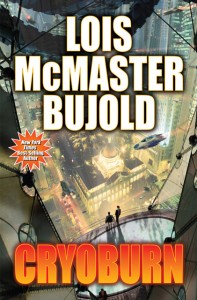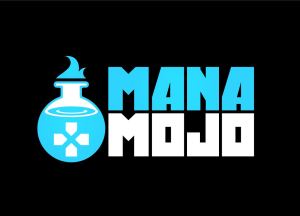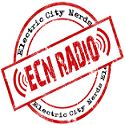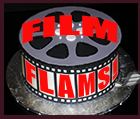 Welcome to the sixth instalment of Dust Jacket, and the first of 5 reviews in five weeks highlighting this year’s Hugo Award nominees. We’re opening up Hugo month with a look at Lois McMaster Bujold’sCryoburn, book 14 in her highly praised Vorkosigan saga.
Welcome to the sixth instalment of Dust Jacket, and the first of 5 reviews in five weeks highlighting this year’s Hugo Award nominees. We’re opening up Hugo month with a look at Lois McMaster Bujold’sCryoburn, book 14 in her highly praised Vorkosigan saga.
This week, my co-conspirator Luke is in control. So take it away, Luke!
WHAT YOU NEED TO KNOW
Drugged and alone on the streets of Kabou-daini, Lord Miles Vorkosiganfinds himself trying to evade capture at the hands of a local terrorist cell. Only a few hours on the planet and already somebody wants him dead.
They’d have succeeded too, if not for the timely intervention of Jin Sato. Against his better judgement, the twelve-year-old takes the rambling madman to his sanctuary. As the drugs pass, Vorkosigan finds himself in the care of a boy whose mother disappeared under mysterious circumstances, who himself is in the reluctant care of Suze, a woman with connections to the cryocorps that keeps the planets economy afloat.
After Jin goes missing running a message to Vorkosigan’s embassy, Miles uses all the resources at his command to track the boy down. After all, he has suspicions that the disappearance of Jin’s mother may be tied up in Vorkosigan’s mission. The cryocorps of Kabou-daini have begun trading in the Barrayan Empire. Cryogenics is now a tradeable commodity. But where there’s commerce, there’s takeover. Emperor Gregor has dispatched his most trusted agent to investigate a threat to the empire. And Lord Vorkosigan, the Imperial Auditor, will put his life and those around him in danger to uncover such a conspiracy.
WHAT WE THOUGHT
LUKE: Confession time. I have not read a single book by Lois McmasterBujold. I know. I know. Multiple Hugo and Nebula winner.Creator of Miles Vorkosigan. However I’m at the table and have glanced at the menu. Light.But with a few rich flavours. It should be noted that Cryoburn is book fourteen of the Vorkosigan saga. For the most part it stands alone. Whilst there are references to events from preceding books, the story doesn’t rely on previous knowledge. These references serve to strengthen the relationships and gives the characters gravitas. Because Bujold uses these references sparingly, the backstory never comes across as expositional. With two exceptions, I deem this safe for you non-series culturalites. Exception 1: The aftermath, but more on that later. Exception 2: I got the feeling that the great Vorkosigan novels were long past. Cryoburn isn’t bad. It’s just not as exciting as it could have been.
DAVID: Like you, I’ve never delved into the world of Miles Vorkosigan, and while Cryoburn does indeed stand alone as a complete story, there were times that I was left with the feeling that I was missing part of the story, as though I’d walked in half way through a much larger tale. There were occasional references that Bujold assumes the reader understands, comments about Clone Brothers and the like that highlighted this sensation. I understand that there’s a certain expectation that readers will have read earlier books, but without that foundation, some of the more subtle elements of the novel were lost on me.
LUKE: Imperial Auditor Lord Miles Vorkosigan is Cryoburn’s greatest asset and key weakness.Bujold establishes right from the start that inspite of his heroic qualities he needs people to extricate him from danger. His vulnerability, and the fragile state of his body, separate him from the 007’s and Men of Steel that populate both SF and mainstream thrillers. It also means he empathises with others also vulnerable. It’s partly why he forges the relationship with Jin, his twelve-year-old rescuer. With that empathy comes a sense of responsibility. Vorkosigan himself tells a story about his father witnessing his grandmother’s execution. He then tells his audience that nobody denied his father the experience. Jin and his sister Mina, whose mother was taken but never found, have been denied the right to grievance, to vengeance, to closure. “For Jin and Mina, there’s just… silence. Frozen silence.” In one simply but elegantly written monologue, Bujold gives us the reason to care about her hero: he will fight for those more vulnerable than himself. He’s a manipulator, condones torture when it suits his purpose, and not above sending his friends into certain danger if it produces the desired results. But he’s also compassionate, witty, clever, charismatic and energetic. A layered protagonist. His appeal is not hard to detect.
DAVID: Bujold writes Vorkosigan with a deft hand and a familiarity that can only come from a deep understanding of the motivations and drive of her protagonist. It’s not surprising given that she’s been writing Miles for more than 20 years. That familiarity works in the book’s favour; I felt a strong connection to Vorkosigan despite having never read a single tale featuring him before. There’s a depth and complexity to the character that makes him instantly appealing as a protagonist.
LUKE: Whilst the forays into Jin’s story occasionally disrupts the intrigue, he himself is never obnoxious, has an adventurous if cautious spirit, and a nice sense of innocence. The rigours of the wider world haven’t caught up with him yet, and he appears to be in no hurry to grow up. Vorlynkin manages to be bureaucratic yet sympathetic to the plight of Jin and his sister. Inspite of his believable concerns as the Barrayan ambassador, he is never one note. He is the first to ask Miles how they are to help Jin and Mina’s mother after the Imperial Auditor states they have nothing but frozen silence. He also tries to protect the children during the climax. Roic, Miles’ bodyguard, is probably the least interesting character. He gets caught up in much of the action but doesn’t contribute much as character. Having said that, Roic has probably shone brighter in previous novels. To me, he was wooden.
DAVID: I definitely got the feeling that Roic’s greatest moments as a character probably occurred earlier in the series. Bujold writes him with a comfortable familiarity that the audience is meant to share, as though we know him as intimately as she does. Unfortunately, as a newcomer to the series, I found very little of interest in Roic’s depiction in Cryoburn. As you say, he offers little to the story and comes across a little wooden. It’s unfortunate, as Bujoldpopulates Kibou-Daino with a wonderful array of supporting characters beyond Roic, from Jin to Suze the Secretary to Vorlynkin.
LUKE: The problem with Cryoburn is once you get passed Vorkosigan and his entourage, the book itself is somewhat bland and generic. Kibou-Daini never feels anything other than a low rent Los Angeles, 2019. The central idea behind the place is that it’s “a whole planet so obsessed with cheating death that even the street people managed to scavenge hope.” The two points of view we have on the world, Vorkosigan (an outsider) and Jin (a child still growing), only skim this concept. Perhaps what Bujold needed was a perspective from an older inhabitant. Suze, caretaker of both Jin and the illicit cryo-revival unit which becomes essential to the plot, might’ve been ideal. Cynical, wily, she wouldn’t have driven the action but given voice to Kibou-daini itself. Yes, the story is about Vorkosigan trying to work out what’s going on, to which Suze (and Jin’s mother, Lisa Sato) give some explanation. But some insight from a character living in this world might’ve given rise to some of its complexities and made it more involving. Instead, it’s just mean streets and neon lit skyways.Nothing wrong with that. But there are more evocative examples.
DAVID: I think you’re selling Kibou-Daini a little short here. I found the world itself to be fascinating, and the corruption and intrigue inherent in the system held my interest beyond the shortcomings in the plot itself. Bujold has created a fascinating world; I just wish she’d found a more compelling story to go with it.
LUKE: The plot itself, whilst being acceptable on a surface level, lacks the intrigue and complexity that should be part and parcel with an espionage tale. The discoveries about the cryocorpsreally aren’t very interesting. Some of the plot points (such as the discovery of Jin and Mina’s mother) are predictable. There’s also a lack of tension, primarily because there is never a genuine threat. The New Hope Legacy Liberators, the terrorist group who try to kidnap Miles at the start, remain incompetent bunglers throughout. WhiteChrys, the cryocorps Miles is investigating, don’t really put up much of a fight. Surely if they want to expand into Imperial Space, they’d try to get a better sense of who they’re dealing with? As a result Miles works things out far too quickly. Aside from the start, he is never in any real danger. A high status character (Lord is his title), and always protected, he views a number of events from relative safety. Yet he’s the most magnetic character in the book. This is where he becomes the key weakness. If the most interesting character in the book is never under threat, then there’s nothing to hold our interest. It may’ve been better to leave Vorkosigan on the streets, fending for himself and Jin’s life. Granted Bujold may’ve used this in another novel. If she has, she needed to come up with a better plot line for Cryoburn. If she hasn’t then why didn’t she use it here?
DAVID: This is really where the flaws in Cryoburn become apparent. Bujold has created an interesting world and populated it with diverse and intriguing characters, but offers little in the way of a compelling story to thrust these characters into. I felt no genuine tension or sense of mystery in the plot; the challenges Miles faces are easily dispatched and the mystery is at best predictable. The book opens beautifully, with Miles experiencing the aftereffects of the kidnapping and the threat of possible capture, but fails to deliver beyond those early chapters.
LUKE: To the elements that jar for new readers; the arrival of Lord Mark, Miles’ brother. Whilst he is mentioned in the earlier parts of the novel, his arrival for a new reader is a little sudden and a bit intrusive. Whilst his involvement with the cryo business is explained, it probably should’ve been introduced and developed much earlier. He doesn’t distract, but his appearance, coming as late as it does, isn’t really necessary.
The Aftermath. Admittedly this is more an element for long time readers anyway, and it does have some ties thematically to the main story (immortality, death/life needing to have meaning). However given that it deals with Miles’ father (talked about in the book, but never appearing himself) it’s hard for a new reader to feel anything deep about what happens given that we don’t have an emotional connection to him.
DAVID: Cryoburn is an entertaining diversion, a solid book that manages to hold the reader’s attention. Unfortunately, it never really elevates itself beyond that level, and left me lamenting the failure of the book to really captivate me beyond its excellent opening chapters. 2 Lukes.
Ratings: An enjoyable, if unexceptional, adventure. 2.5 Lukes.
IS IT HUGO WORTHY?
LUKE: No. So far it’s the one I’ve most enjoyed. But there’s nothing about it that’s fresh. Nor is it particularly involving story.
DAVID: The Vorkosigan Saga has won four Hugo Awards to date. It’s clearly a fan favourite and may claim the award based on name recognition alone. It wouldn’t necessarily get my vote, but it’s definitely a strong contender for this year’s award.
WHAT DO YOU THINK?
Is there something more to the Vorkosigan saga than we’ve seen as first-time readers? Is this series truly worthy of the praise lavished upon it by others, or is our assessment of Cryoburn representative of the series as a whole? Send us your comments, criticisms and, most importantly, your votes! Help us compile the definitive list of Greatest Sci-Fi Masterpieces.
BEHOLD…THE FUTURE!
Next week, we’ll continue Hugo Month with a look at the second of our five nominees, Mira Grant’s Feed.








